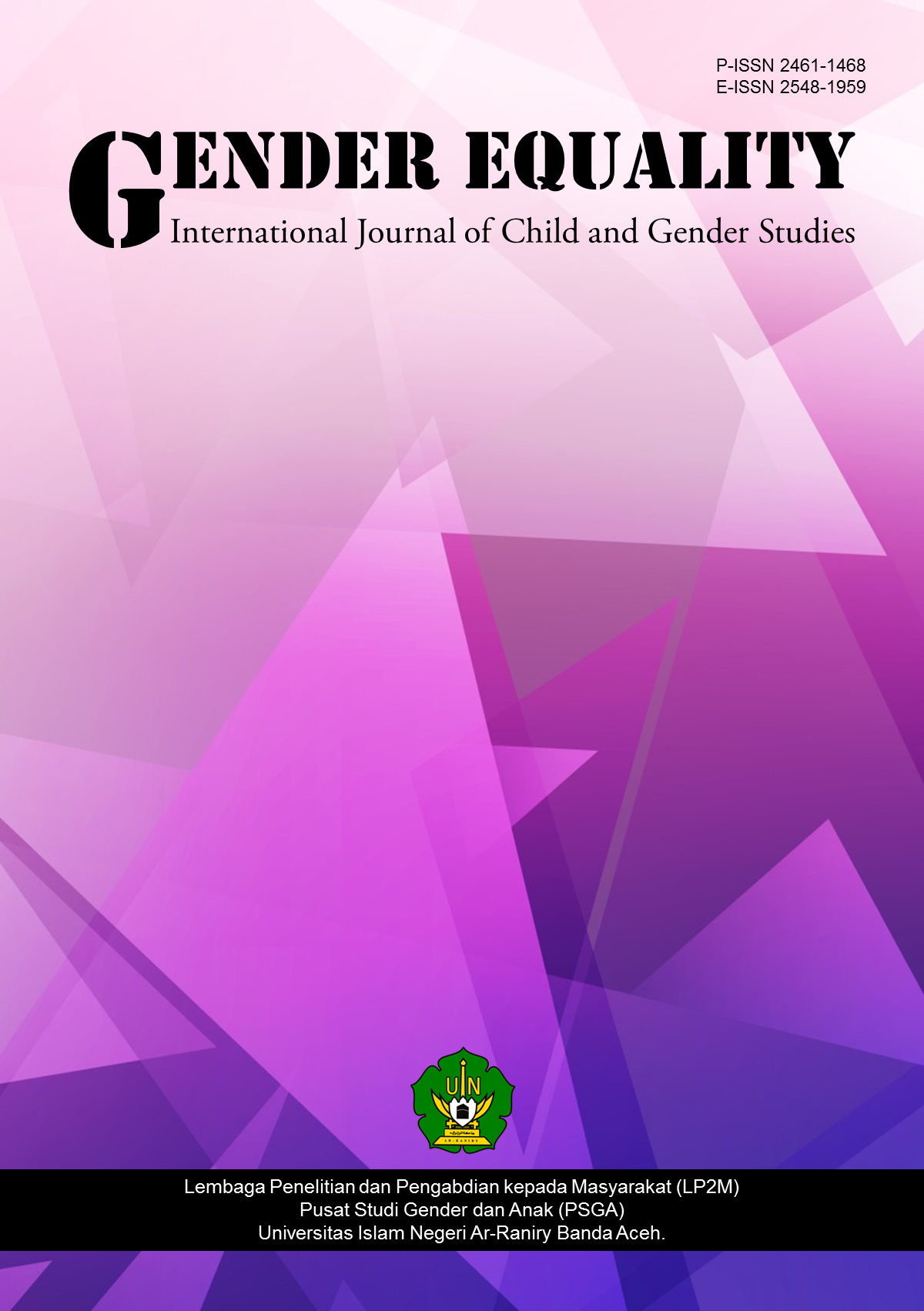PERLINDUNGAN PEREMPUAN DAN ANAK: STUDI AKIBAT HUKUM PENGABAIAN PENCATATAN PERKAWINAN
DOI:
https://doi.org/10.22373/equality.v6i1.5633Keywords:
Women, Children, Marriage Registration, Family LawAbstract
Marriage registration becomes a very important element for the validity of marriage. An unregistered marriage has a direct effect on the woman (wife) and child. This problem is one of references for the importance of registering marriage. Marriage registration aims to fulfill women and children’s rights as legal subjects. The work intends to explain how urgent the registration of marriage is in protecting women and children. Using research libraries, data are collected by exploring data sources that are relevant to the topics discussed. This study concludes that the legal impact arising from neglecting marriage registration is not easy. When a dispute occurs, the wife of an unregistered marriage cannot sue her husband. In this case, the wife's position is very weak. Likewise with children, the status of children born is considered as illegitimate children. The child’s unclear status in the eyes of the law causes the parent-child relationship is not strong, so parents may be able to deny his biological child.
References
Al-Anshari, Abu Yahya Zakariya. t.t. Fathul Wahab. Libanon: Darul Fikri.
Al-Mugniyyah, Muhammad Jawâd. (t.t.). al-Fiqh ‘alâ Madzâhib al-Khamsah. Beirut: Dâr al-Kitâb al-‘Ilmiyyah.
Depag RI.
Effendi, Satria. (2004). Problematika Hukum Keluarga Kontemporer. Jakarta: Balitbang
Friedman, Lawrence M. (2011). Sistem Hukum Perspektif Ilmu Sosial. Bandung: Nusa
Joni, Muhammad. (2013). “Perkawinan Yang Tidak Dicatatkan: Dampaknya Bagi Anak” dalam jurnal Musâwa, Vol. 12 (2), 237-259.
Kementerian Pemberdayaan Perempuan dan Perlindungan Anak, Laporan Telaah Perkawinan Sirri dan Dampaknya di Provinsi Jawa Barat, makalah dapat diunduh di kemenpppa.org
Khoiriyah, Rihlatul. (2017). Aspek Hukum Perlindungan Perempuan dan Anak dalam Nikah Siri dalam Jurnal Sawwa. Vol. 12 (3), 397-408.
M.D., Mahfud. (1998). Politik Hukum di Indonesia. Jakarta: LP3ES.
Media.
Mustika, Dian. (2011). “Pencatatan Perkawinan dalam Undang-undang Hukum keluarga di Dunia Islam” dalam Jurnal Inovatif. Vol. 4 (5), 52-64.
Muttaqin, F. (2015). Early Feminist Consciousness and Idea Among Muslim Women in 1920s Indonesia. Jurnal Ilmiah Peuradeun, 3(1), 19-38.
Nasihudin, Muh Rofiq. Pencatatan Perkawinan Sebagai Syarat Sah Pernikahan Di Indonesia Perspektif Hukum Islam. makalah tidak diterbitkan.
Nasution, Khoiruddin. (2013). “Pencatatan Sebagai Syarat Atau Rukun Perkawinan: Kajian Perpaduan Tematik dan Holistik”, dalam Jurnal Musawa. Vol. 12 (2), 165-185.
Nawawi, Hasyim. (2015). “Perlindungan hukum dan Akibat Hukum Anak dari Perkawinan tidak Tercatat Studi di Pengadilan Agama Tulung Agung” dalam Jurnal Ahkam. Vo. 3 (1)
Sartini dkk. (2016). “Kriminalisasi Nikah Siri dalam Persfektif Hukum Pidana” dalam Jurnal Legalitas. Vol. 8 (1), 1-47.
Shihab, M. Quraish. (2007). Tafsir Al-Mishbah: Pesan Kesan Dan Keserasian Al-Qur'an. Jakarta: Lentera Hati.
Soekanto, Soerjono dan Abdullah Mustafa. (1982). Sosiologi Hukum Dalam Masyarakat. Jakarta: Rajawali.
Syaltut, Mahmud. (t.t). al-Fatawa: Dirasah al-Mushkilat al-Muslim al-Mu‘aşir fî Hayatihi al-Yaumiyahal-‘Ammah.
Tabrani ZA. (2011). Nalar Agama dan Negara dalam Perspektif Pendidikan Islam. (Suatu Telaah Sosio-Politik Pendidikan Indonesia). Millah Jurnal Studi Agama, 10(2), 395–410.
Verlo, M. (2015). Religion, Church, Intimate Citizenship and Gender Equality. Jurnal Ilmiah Peuradeun, 3(1), 55-76.
Warassih, Esmi. (2005). Pranata Hukum Sebuah Telaah Sosiologis. Semarang: Surya Alam Utama
Undang-undang, Putusan, dan Fatwa
KHI, Pasal 7 ayat (1).
UU No. 1 Tahun 1974 Tentang Perkawinan
Salinan Keputusan Ijtima’ Ulama Komisi Fatwa Se-Indonesia Kedua Tahun 2006
Pasal 143 Draft RUU Hukum Materiil Peradilan Agama Bidang Perkawinan.
Salinan Putusan Mahkamah Konstitusi Nomor46/PUU-VIII/2010
Downloads
Published
Issue
Section
License
GENDER EQUALITY: International Journal of Child and Gender Studies allows the author(s) to hold the copyright and to retain the publishing rights without restrictions. Authors who publish with this journal agree to the following terms:
- Authors retain copyright and grant the journal right of first publication with the work simultaneously licensed under a Creative Commons Attribution License that allows others to share the work with an acknowledgment of the work's authorship and initial publication in this journal.
- Authors are able to enter into separate, additional contractual arrangements for the non-exclusive distribution of the journal's published version of the work (e.g., post it to an institutional repository or publish it in a book), with an acknowledgment of its initial publication in this journal.
- Authors are permitted and encouraged to post their work online (e.g., in institutional repositories or on their website) prior to and during the submission process, as it can lead to productive exchanges, as well as earlier and greater citation of published work.



